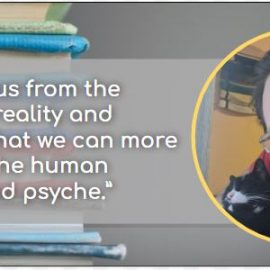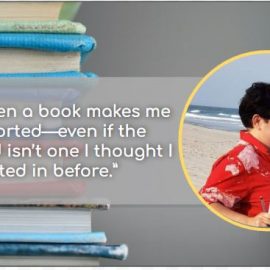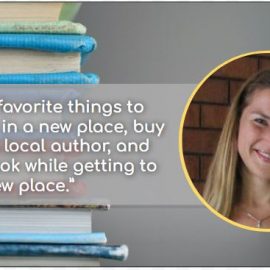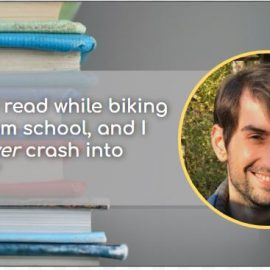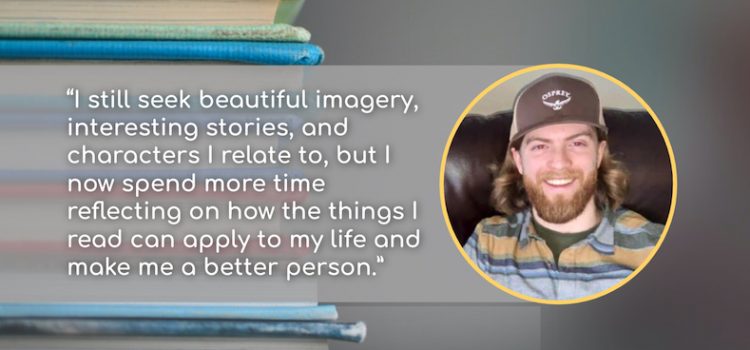
What two authors can describe a simple smile with deep nuance? What kind of hat did Daniel Boone actually wear? What makes Marcus Aurelius’ Meditations more accessible?
James could tell you. Based in Iowa, he’s a book guide writer at Shortform. We interviewed him recently to learn about the books he reads, why he reads them, and what he gets out of them.
Our Interview With James
James is a reader who is touched by beautiful prose and inspired by catalysts for growth. Here’s our interview with him.
What’s your favorite book and why?
My favorite book is The Master and Margarita by Mikhail Bulgakov. I’m endeared to this book because of its absurd, dark humor and the beautiful love story it tells. Bulgakov takes you on a wild, surreal ride, following the path of the devil and his crew of mystical henchmen as they wreak havoc throughout Moscow in the 1930s. Together, they toy with human folly and tempt people’s vices. However, for all of its darkness, this book never succumbs to cynicism. For example, the devil is eventually stumped when he encounters a citizen who isn’t motivated by greed but, instead, by love. Likewise, the darkness brought by the devil reveals in other characters inspiring acts of courage, compassion, redemption, and honesty.
What are you reading these days?
I recently finished The Upside of Stress by Kelly McGonigal for Shortform, and I’m currently reading Boone by Robert Morgan for pleasure. Next on my reading list is probably Blood Meridian by Cormac McCarthy.
If you could have a dinner party with any three authors—dead or alive—who would they be and why?
Steven Rinella, Henry David Thoreau, and Emily Dickinson. I think Rinella and Thoreau would be interesting to pair at a dinner party because I’m sure they’d have a spirited debate about environmental philosophy. Rinella would likely defend conservation—sustainable use of natural resources—while Thoreau would probably push for preservation—protection of nature from use. Rinella is also a no-brainer guest to have at a dinner party because he’s an excellent cook—most of the books he’s written are cookbooks. I’d put him in charge of the menu.
I’d like to have Emily Dickinson at my dinner party to tell her how influential and widely appreciated her poetry is. It was after her death that the vast majority of her work was discovered and made available to the public. So, she’d probably be pretty surprised to find out her work is being read by so many people today. I don’t know if she’d be excited about a dinner party, though. She was notoriously reclusive. I’d have a to-go box ready for her in case she’d want to duck out early.
What’s your favorite genre? Why does it intrigue you?
My favorite genre is probably literary fiction. I’m interested in stories that are driven by complicated characters—haunted souls, reluctant heroes, and redeemed villains. My favorite fiction writers articulate the beautiful nuances of daily life: the subtle language of silence and the internal toils that lead to growth and change.
What’s your favorite way to read a book?
I’ve always wanted to be able to read in public places—coffee shops, parks benches, and so on, but I usually just end up people-watching when I try. My true favorite place to read is in the woods where I grew up playing, fishing, and hunting. There’s a west-facing hillside covered in ancient oaks and sycamores that overlooks a river. I lay on this incline and read—preferably with a paper copy—nap, or watch the sunset. When I can’t be there, my favorite place to read is in bed.
What book do you think everyone should read in their lifetime?
The Master and Margarita by Mikhail Bulgakov because it’s taught me to laugh at my own follies and misfortunes. Also, Meditations by Marcus Aurelius because it’s taught me to accept what I can’t control, to look at each day as an opportunity to help others, and that kindness is unconquerable. Finally, A Sand County Almanac by Aldo Leopold because it’s strengthened my relationship with nature by encouraging me to appreciate nature’s subtle beauty and to develop a deeper sense of responsibility for the land.
Who are your favorite authors?
Mikhail Bulgakov is one of my favorites because of his dark humor and exploration of themes like love, courage, and authenticity.
I love F. Scott Fitzgerald and Virginia Woolf for their beautiful prose. I particularly admire these two authors for their profound ability to articulate the feelings and messages people communicate without words. For example, their descriptions of something as seemingly simple as a smile are so deeply nuanced. Here’s Woolf’s description of a smile in To the Lighthouse: “He smiled the most exquisite smile, veiled by memory, tinged by dreams.” Here’s Fitzgerald’s description of Gatsby’s smile in The Great Gatsby: “He smiled understandingly—much more than understandingly. It was one of those rare smiles with a quality of eternal reassurance in it, that you may come across four or five times in life. It faced—or seemed to face—the whole external world for an instant and then concentrate on you with an irresistible prejudice in your favor. It understood you just as far as you wanted to be understood, believed in you as you would like to believe in yourself, and assured you that it had precisely the impression of you that, at your best, you hoped to convey.”
Finally, I love reading Steven Rinella because of his thoughtful approach to cooking, hunting, and conservation. Most of all, I admire his deep awareness and appreciation of the food he eats and the places he explores.
How have your reading tastes changed over the years?
I used to read a lot of survival fiction, horror fiction, and mysteries, but now I mostly read history, philosophy, and literary fiction. My reading tastes have changed from reading purely for entertainment to reading for growth. I still seek beautiful imagery, interesting stories, and characters I relate to, but I now spend more time reflecting on how the things I read can apply to my life and make me a better person.
Was there a specific book that sparked your love of reading?
Yes, Hatchet by Gary Paulsen. I read this book in fourth grade. It was the first book I read in one day. I just ate it up. I remember loving the high-stakes adventure of trying to survive in nature with nothing but a hatchet. I really related to it at the time, as a boy who loved to play in the woods.
Do you have any guilty-pleasure books?
Scary Stories to Tell in the Dark by Alvin Schwartz. I loved this series as a kid, and I still return to it for a burst of nostalgia once in a while. The stories seem cheesier every time I read them, but I appreciate the series’ eerie illustrations more and more.
What’s an interesting fact that you learned from a book recently?
While reading Boone by Robert Morgan, I learned that, contrary to Hollywood’s depiction of him, Daniel Boone didn’t wear a raccoon skin cap with a big, bushy tail. He actually thought these were uncomfortable and impractical. Instead, he wore a beaver felt hat because they’re lighter and water-repellent.
Have any books you’ve read caused you to make any life changes or to develop any habits?
Aldo Leupold’s acute awareness and knowledge of plants and animals demonstrated in A Sand County Almanac inspired me to become more observant when I’m out in nature. Whenever I encounter a plant or animal I don’t recognize, I try to identify it and learn something about it; I love the plant and animal identification app Seek. This habit leads to a lot of stopping and staring when I’m hiking, haha!
What’s your favorite quote from a book or an author?
“The great revelation perhaps never did come. Instead, there were little daily miracles, illuminations, matches struck unexpectedly in the dark.” (Virginia Woolf, To The Lighthouse)
I love this quote because it summarizes my pursuit of good, truth, and beauty. I’ve never been struck with a life-altering revelation but, rather, the most beautiful moments or meaningful ideas in my life tend to sneak up on me in small ways.
What are your favorite book adaptations and why?
The Haunting of Hill House. Shirley Jackson’s 1959 novel The Haunting of Hill House has been adapted into a couple of movies and recently inspired the Netflix show by Mike Flanagan. I’ve only read Jackson’s novel and watched Flanagan’s series, and I love them both. The series isn’t really an adaption of the book, but it’s informed by her story and deals with many of the same themes, such as grief, death, isolation, and mental illness. Jackson’s novel is darker and much heavier on psychological horror—of course, books can explore the inner thoughts of characters much better than shows or movies can—whereas the show blends psychological horror with more external, supernatural elements. I like how the show explores many of the dark themes of Jackson’s book in the context of a troubled family rather than strangers meeting to investigate paranormal activity; I have a big family, so I just personally relate to this premise more. I also admire how the show manages to remain optimistic despite the dark ideas it grapples with, focusing more on themes like love, forgiveness, and reconciliation.
Are there any lesser-known books that you’ve read that you want others to know exist?
Yes, Black Elk Speaks by John G. Neihardt. This book has given me a fuller understanding of North American history and an introduction to Lakota religion and philosophy, and it has inspired in me a deeper appreciation and sense of responsibility for the land I live on.
Black Elk Speaks tells the story of an Oglala Lakota medicine man who lived during the turn of the 20th Century, a time of dramatic change and tragedy for indigenous people. In his lifetime, Black Elk fought alongside Crazy Horse—his second cousin—during the Battle of Little Bighorn, toured with Buffalo Bill’s Wild West Show throughout U.S. cities and Europe, and witnessed the Wounded Knee Massacre. Throughout his life, Black Elk was haunted by the burden of a spiritual vision he experienced when he was young. This vision showed his native land restored and the Lakota living in unity with all things. Tragically, he felt responsible for not finding a way to fulfill this vision in reality and carried this guilt with him into old age.
I traveled to Black Elk Peak in the Black Hills of South Dakota last summer, where it’s believed Black Elk had his spiritual experience. When I looked over the beautiful hills from that peak and reflected on Black Elk’s relationship with the land, my eyes welled up with tears. It’s impossible to imagine the depth of Black Elk’s intimacy with his environment, but moments like these lead me to think about how different our world may look if we try to maintain even a wisp of Black Elk’s love and understanding of nature.
At Shortform, how do you go about working on a book that has viewpoints you don’t agree with?
If I encounter a book with a viewpoint I don’t agree with, I try to understand the viewpoint more thoroughly to discover where it diverges from my own perspective and why. By sincerely exploring an opposing viewpoint and doing my best to support its reasoning, I force myself to consider the validity of my own perspective, either strengthening it or replacing it with a superior alternative. To help myself stay properly oriented during this process, I remind myself that the goal is not to win an argument but to come as close to the truth as possible.
What are your favorite books in the Shortform library and why?
One of my favorite books in the Shortform library is Meditations by Marcus Aurelius because our guide gives structure to Aurelius’ disorganized array of journal entries, making his ideas more accessible and cohesive.
James’ Recommended Reading List
- The Master and Margarita by Mikhail Bulgakov
- Meditations by Marcus Aurelius
- A Sand County Almanac by Aldo Leopold
- Black Elk Speaks by John G. Neihardt
About the Series
At Shortform, we want to give our employees names and faces so you can get to know the people who make the magic happen. That’s why we’re doing the Shortform Reads series, where we interview our employees and share their thoughts and opinions. You can check out more employee interviews here.

